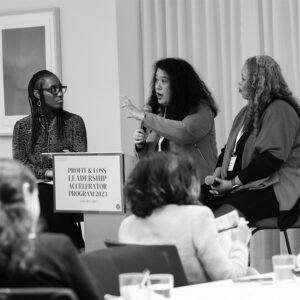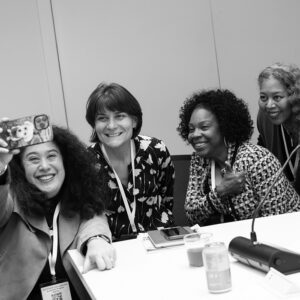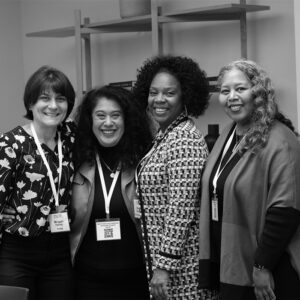Have you ever walked into a room full of people and felt alone? If you have – you understand it’s a very uncomfortable feeling and this is one of the many challenges multicultural women are met with in corporate America. According to the McKinsey & Company’s 2022 Women in the Workplace report, women—and especially women of color—are still dramatically underrepresented in corporate America. This is magnified when looking at senior leadership where only one in four c-suite leaders is a woman, and only one in 20 is a woman of color.
Cynthia North, Executive Director, RLT Patient Marketing, Novartis, knows these challenges all too well. Her previous employer, Merck, nominated her to participate in Paradigm for Parity’s (P4P) executive coaching pilot program aimed at helping multicultural women gain the tools to advance in their industries and break the ceiling to the c-suite.
Read more about how Paradigm for Parity is paving the path towards gender equity with leadership coaching.
In part 4 of our gender equity series, Cynthia shares how coaching has taught her the skills to “play to win” instead of “playing not to lose.” In this Q&A, Cynthia discusses how coaching has changed her outlook on how to work her way to the top of her industry and why doing so is imperative for younger generations.

A: The matching process was very similar to online dating, funny enough. We submitted different preferences and Ace-up used their database to match us with coaches that deemed a good fit for our personalities and goals. We interviewed with a select group of coaches before ultimately deciding who we wanted to work with.
Q; What are some of the biggest takeaways you’ve had from your experience with a coach?
A: There is a huge misconception about coaching and the kind of people who seek help from a coach.
Many believe that people seek out coaching when they need to make up for a shortcoming to maintain their role, but that is wildly untrue. Coaching is an opportunity for even the most successful c-suite executive to, in my words, sharpen their own saw.
Coaching is for people who are doing well and believe that they can propel their careers even further if given the right tools. That’s why they take the initiative to work with a coach and proactively learn those necessary skills to help them accelerate in their roles. Being able to do so with someone from outside your organization only adds to the value of coaching. Often employees will shy away from being fully open and honest with someone from within their organization because we feel as though there will be consequences for exposing our vulnerabilities and weaknesses.
Q: Were there any specific moments that stuck with you from the coaching?
A: One memorable moment was when leaders from the Emory Business School and Dr. Sheila Robinson asked the P4P group , “Are you playing to win? Or are your playing to not lose?” While this is obviously a very nuanced question, because of course, most of us thought we were playing to win. However, there is more than a subtle difference between the two. When you are playing not to lose, you’re often scared to make a mistake and you play in safe. When you are playing to win, you are more willing to take risks and make mistakes. You are fierce, proactive and you don’t see losing as a threat. When taking a risk, we will think, “what if I fail,” when we really need to believe “what if I fly?” We worked with our coaches regarding where we would be today if we spent our careers playing to win rather than playing not to lose and it was really eye opening.
What has really stuck with me is learning what kind of behavior has worked for me in the past and what hasn’t is what has really stuck with me. Specifically, I learned that my extrovert behavior comes with a lot of energy and I have to be more mindful of how I land on others—especially those who are more introverted. It’s best to avoid one-size-fits-all approach to interactions and relationship-building. I learned how to more closely mirror the behaviors and styles of those I am interacting with.
The other lesson that struck me from the program was when we discussed the importance of performance, image, and exposure. We learned that 60% of growth trajectory is a product of how much exposure one gets in their organization, and only 10% is a product of performance.

Why do you believe it’s important for multicultural women to consider working with an executive coach?
It’s hard to be something that you don’t see. Regrettably, we don’t see a lot of multicultural women in c-suite positions in corporate America and it is unsettling to feel like you stand apart in a room. We often put up a protective guard to not act in a way that conforms to the stereotypes that others may have placed on us for generations.
For women to transcend those pressures and envision themselves in c-suite roles, we need executive coaches. To get the negative messaging out of our heads and learn the tools to be successful – there needs to be space for us.
Ultimately, as women and women of color we should be striving to work our way to the top so that generations to come have the role models that we did not.



